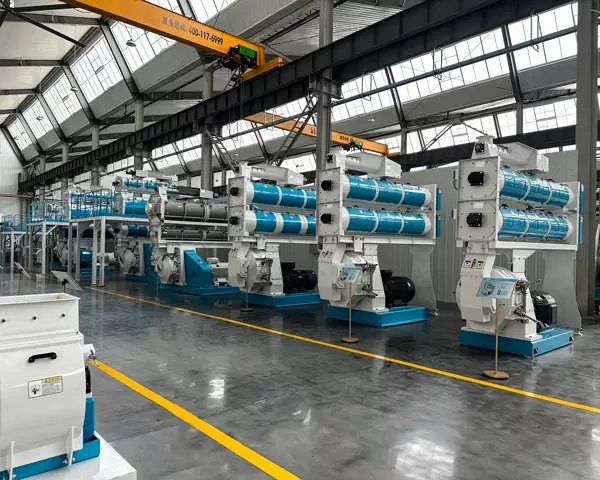Pellet mill is an important equipment used to convert raw materials into granular products and is widely used in biomass energy, feed processing, chemical industry and other fields. However, various faults may be encountered during use, affecting the normal operation of the equipment. This article will explore the common causes of pellet mill failures and provide some repair methods to ensure long-term stable operation of the equipment.
(1) The humidity of raw materials is too high
The humidity of the raw materials is too high, which can easily cause the pellet mill to become clogged. Because the humidity of the raw material is too high, the temperature inside the machine will increase, which will increase the pressure inside the machine, making the raw material unable to pass through the die hole of the pellet mill smoothly, resulting in blockage.
(2) Die hole wear
The die hole of the pellet mill is a key component of pelletizing. If the die hole is severely worn, it will lead to uneven discharge. There are two main reasons for die hole wear: one is that it has been used for too long, and the other is that the raw material is too hard. If the pellet mill is used for too long, the surface of the die hole will be worn, thus affecting the granulation effect. If the hardness of the raw material is too high, the friction will increase when the raw material passes through the die hole, thereby accelerating the wear of the die hole.
(3) Accumulation inside the pellet mill
Accumulation inside the pellet mill is also one of the causes of clogging. During use, some fine particles will be produced, and these particles will accumulate inside the pellet mill, thus affecting the normal operation of the equipment. In addition, some grease and impurities will be produced inside the machine, and these grease and impurities will also accumulate inside the pellet mill, thus affecting the normal operation of the machine.
(4) Motor failure
The motor is the power source of the pellet mill. If the motor fails, the equipment will not be able to operate normally. There are two main reasons for motor failure: one is motor overload, and the other is motor winding short circuit. If the load of the pellet mill is too large during operation, it will cause the motor to be overloaded and damage the motor. If the motor windings are short-circuited, the motor will not work properly.

(1) Adjust the humidity of raw materials
If the cause of the pellet mill blockage is that the raw material humidity is too high, it can be solved by adjusting the raw material humidity. Generally speaking, the raw material humidity for pellet mill granulation should be between 12% and 15%. If the humidity of the raw materials is too high, you can reduce the humidity of the raw materials by airing or drying.
(2) Replace the die hole
If the uneven discharge is caused by wear of the die holes, you can consider replacing the die holes. Generally speaking, the die hole life of pellet mill is about 5000 hours. If it is used for too long, the die hole needs to be replaced. In addition, in order to extend the service life of the die hole, you can choose to use a better quality die hole.
(3) Clean up the accumulation inside the pellet mill
If the cause of the blockage is accumulation inside the pellet mill, it can be solved by cleaning the accumulation inside the machine. There are two ways to clean the accumulation inside the pellet mill: one is to use cleaning agent to clean, the other is to use high-pressure water gun to clean. When cleaning the accumulation inside the pellet mill, you need to pay attention to safety to avoid secondary damage to the pellet mill.
(4) Replace the motor
If the reason why the pellet mill is not working properly is a motor failure, you can consider replacing the motor. When replacing the motor, you need to select a motor that matches the pellet mill, and pay attention to whether the motor's power and speed and other parameters meet the requirements.
Through the above maintenance methods, the long-term stable operation of the pellet mill can be ensured. However, there may be differences between different models and brands of pellet mills, so when performing repairs, you should refer to the equipment's operating manual and the guidance provided by the manufacturer. Regular maintenance and upkeep of pellet mills and timely handling of faults can not only extend the service life of the equipment, but also improve production efficiency and product quality, bringing greater economic benefits to users.